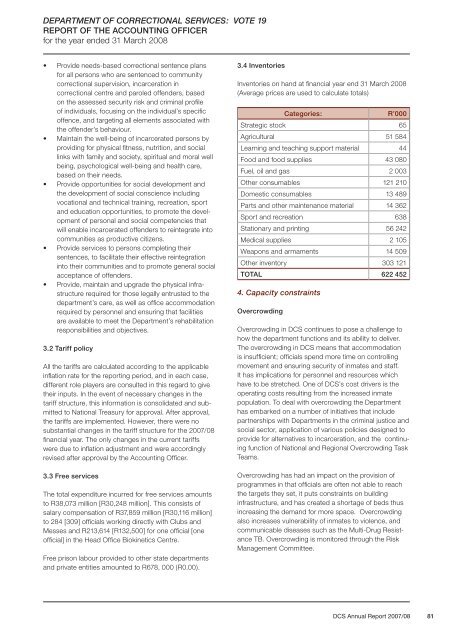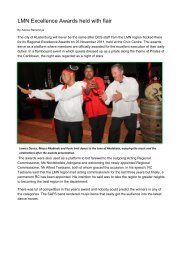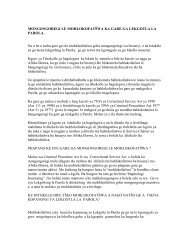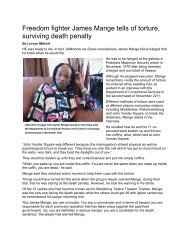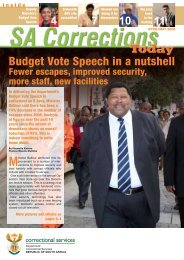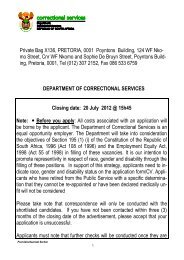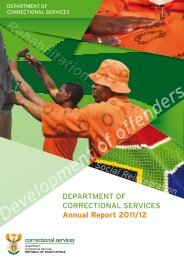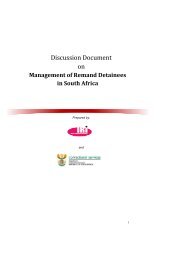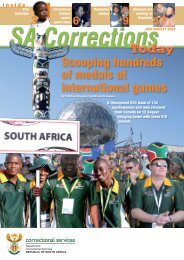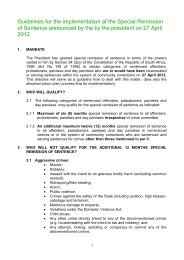As part of our commitment to rehabilitation of offenders, the ...
As part of our commitment to rehabilitation of offenders, the ...
As part of our commitment to rehabilitation of offenders, the ...
You also want an ePaper? Increase the reach of your titles
YUMPU automatically turns print PDFs into web optimized ePapers that Google loves.
DEPARTMENT OF CORRECTIONAL SERVICES: VOTE 19<br />
REPORT OF THE ACCOUNTING OFFICER<br />
for <strong>the</strong> year ended 31 March 2008<br />
•<br />
•<br />
•<br />
•<br />
•<br />
Provide needs-based correctional sentence plans<br />
for all persons who are sentenced <strong>to</strong> community<br />
correctional supervision, incarceration in<br />
correctional centre and paroled <strong>of</strong>fenders, based<br />
on <strong>the</strong> assessed security risk and criminal pr<strong>of</strong>ile<br />
<strong>of</strong> individuals, focusing on <strong>the</strong> individual’s specific<br />
<strong>of</strong>fence, and targeting all elements associated with<br />
<strong>the</strong> <strong>of</strong>fender’s behavi<strong>our</strong>.<br />
Maintain <strong>the</strong> well-being <strong>of</strong> incarcerated persons by<br />
providing for physical fitness, nutrition, and social<br />
links with family and society, spiritual and moral well<br />
being, psychological well-being and health care,<br />
based on <strong>the</strong>ir needs.<br />
Provide opportunities for social development and<br />
<strong>the</strong> development <strong>of</strong> social conscience including<br />
vocational and technical training, recreation, sport<br />
and education opportunities, <strong>to</strong> promote <strong>the</strong> development<br />
<strong>of</strong> personal and social competencies that<br />
will enable incarcerated <strong>of</strong>fenders <strong>to</strong> reintegrate in<strong>to</strong><br />
communities as productive citizens.<br />
Provide services <strong>to</strong> persons completing <strong>the</strong>ir<br />
sentences, <strong>to</strong> facilitate <strong>the</strong>ir effective reintegration<br />
in<strong>to</strong> <strong>the</strong>ir communities and <strong>to</strong> promote general social<br />
acceptance <strong>of</strong> <strong>of</strong>fenders.<br />
Provide, maintain and upgrade <strong>the</strong> physical infrastructure<br />
required for those legally entrusted <strong>to</strong> <strong>the</strong><br />
de<strong>part</strong>ment’s care, as well as <strong>of</strong>fice accommodation<br />
required by personnel and ensuring that facilities<br />
are available <strong>to</strong> meet <strong>the</strong> De<strong>part</strong>ment’s <strong>rehabilitation</strong><br />
responsibilities and objectives.<br />
3.2 Tariff policy<br />
All <strong>the</strong> tariffs are calculated according <strong>to</strong> <strong>the</strong> applicable<br />
inflation rate for <strong>the</strong> reporting period, and in each case,<br />
different role players are consulted in this regard <strong>to</strong> give<br />
<strong>the</strong>ir inputs. In <strong>the</strong> event <strong>of</strong> necessary changes in <strong>the</strong><br />
tariff structure, this information is consolidated and submitted<br />
<strong>to</strong> National Treasury for approval. After approval,<br />
<strong>the</strong> tariffs are implemented. However, <strong>the</strong>re were no<br />
substantial changes in <strong>the</strong> tariff structure for <strong>the</strong> 2007/08<br />
financial year. The only changes in <strong>the</strong> current tariffs<br />
were due <strong>to</strong> inflation adjustment and were accordingly<br />
revised after approval by <strong>the</strong> Accounting Officer.<br />
3.3 Free services<br />
The <strong>to</strong>tal expenditure incurred for free services amounts<br />
<strong>to</strong> R38,073 million [R30,248 million]. This consists <strong>of</strong><br />
salary compensation <strong>of</strong> R37,859 million [R30,116 million]<br />
<strong>to</strong> 284 [309] <strong>of</strong>ficials working directly with Clubs and<br />
Messes and R213,614 [R132,500] for one <strong>of</strong>ficial [one<br />
<strong>of</strong>ficial] in <strong>the</strong> Head Office Biokinetics Centre.<br />
Free prison lab<strong>our</strong> provided <strong>to</strong> o<strong>the</strong>r state de<strong>part</strong>ments<br />
and private entities amounted <strong>to</strong> R678, 000 (R0.00).<br />
3.4 Inven<strong>to</strong>ries<br />
Inven<strong>to</strong>ries on hand at financial year end 31 March 2008<br />
(Average prices are used <strong>to</strong> calculate <strong>to</strong>tals)<br />
Categories: R’000<br />
Strategic s<strong>to</strong>ck 65<br />
Agricultural 51 584<br />
Learning and teaching support material 44<br />
Food and food supplies 43 080<br />
Fuel, oil and gas 2 003<br />
O<strong>the</strong>r consumables 121 210<br />
Domestic consumables 13 489<br />
Parts and o<strong>the</strong>r maintenance material 14 362<br />
Sport and recreation 638<br />
Stationary and printing 56 242<br />
Medical supplies 2 105<br />
Weapons and armaments 14 509<br />
O<strong>the</strong>r inven<strong>to</strong>ry 303 121<br />
TOTAL 622 452<br />
4. Capacity constraints<br />
Overcrowding<br />
Overcrowding in DCS continues <strong>to</strong> pose a challenge <strong>to</strong><br />
how <strong>the</strong> de<strong>part</strong>ment functions and its ability <strong>to</strong> deliver.<br />
The overcrowding in DCS means that accommodation<br />
is insufficient; <strong>of</strong>ficials spend more time on controlling<br />
movement and ensuring security <strong>of</strong> inmates and staff.<br />
It has implications for personnel and res<strong>our</strong>ces which<br />
have <strong>to</strong> be stretched. One <strong>of</strong> DCS’s cost drivers is <strong>the</strong><br />
operating costs resulting from <strong>the</strong> increased inmate<br />
population. To deal with overcrowding <strong>the</strong> De<strong>part</strong>ment<br />
has embarked on a number <strong>of</strong> initiatives that include<br />
<strong>part</strong>nerships with De<strong>part</strong>ments in <strong>the</strong> criminal justice and<br />
social sec<strong>to</strong>r, application <strong>of</strong> various policies designed <strong>to</strong><br />
provide for alternatives <strong>to</strong> incarceration, and <strong>the</strong> continuing<br />
function <strong>of</strong> National and Regional Overcrowding Task<br />
Teams.<br />
Overcrowding has had an impact on <strong>the</strong> provision <strong>of</strong><br />
programmes in that <strong>of</strong>ficials are <strong>of</strong>ten not able <strong>to</strong> reach<br />
<strong>the</strong> targets <strong>the</strong>y set, it puts constraints on building<br />
infrastructure, and has created a shortage <strong>of</strong> beds thus<br />
increasing <strong>the</strong> demand for more space. Overcrowding<br />
also increases vulnerability <strong>of</strong> inmates <strong>to</strong> violence, and<br />
communicable diseases such as <strong>the</strong> Multi-Drug Resistance<br />
TB. Overcrowding is moni<strong>to</strong>red through <strong>the</strong> Risk<br />
Management Committee.<br />
DCS Annual Report 2007/08 81


